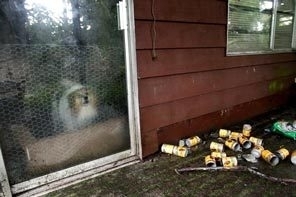
UPDATE AT BOTTOM OF POST!
It finally appeared that luck was changing for Lucky, the Seattle-area dog who spent most, if not all, of the last four years confined to a filthy basement. Neighbors say that several times a week, a man could be seen dumping food in through the sliding glass door, but the dog was starved for stimulation and companionship. He’d throw himself against the wall whenever he heard the sound of human voices.
Then last month, Lucky was turned over to local animal control officers. Authorities could now investigate the situation and make what, we hoped, would be a humane and fair decision about the animal’s future. Dogs Deserve Better ‘s Kelly Page, (and others in the Seattle area) who’d spent countless hours advocating for Lucky, were optimistic. Efforts were now aimed at getting the dog transferred from the stressful municipal custody environment into a loving foster home.
But over the weekend (and under the radar), Lucky was returned to his original owners. Because he’s given ample food and water and isn’t physically abused, there is not sufficient evidence, according to the Regional Animal Services manager, to prosecute his owners – not even for neglect .
It’s impossible to know exactly what the dog endured. His owners say he is permitted to roam areas of the house outside the basement, that he is loved and well cared for, that his defecation is cleaned up “monthly.” Yet neighbors say that for two months, the owner had left town, “leaving Lucky in the basement to be sporadically fed by her ex-husband.”
The fact is, food, water, and the absence of physical mistreatment is not a good life for a dog. It’s not even adequate. It’s said that after just two weeks in a shelter setting (where, unlike Lucky, dogs often receive walks and can expect their kennels to be cleaned daily ), an animal’s mental health begins to decline. Without stimulation and companionship, boredom, loneliness, and stress take a heavy toll. Sometimes irreversibly so.
King County officials say that going forward, they will regularly check in on Lucky and work with his owners to ensure he receives adequate care. In the meantime, our job is to let lawmakers know that adequate care means more than food and water. Companionship, stimulation, and respect for one’s pets are non-negotiable. After all, if solitary confinement with two meals a day is not considered punishment, then why do we reserve such a sentence for our worst human criminal offenders?
Lucky has done nothing wrong. Please let authorities in King County know that the status quo is unacceptable.
King County Executive and Staff:
Dow.Constantine@kingcounty.gov , kcexec@kingcounty.gov
Carrie.Cihak@kingcounty.gov, Frank.Abe@kingcounty.gov
Ken.Nakatsu@kingcounty.gov , fred.jarrett@kingcounty.gov
King County Council Members and their staff:
jane.hague@kingcounty.gov ; larry.gossett@kingcounty.gov ; larry.phillips@kingcounty.gov ; pete.vonreichbauer@kingcounty.gov ; julia.patterson@kingcounty.gov ; kathy.lambert@kingcounty.gov ; bob.ferguson@kingcounty.gov ; reagan.dunn@kingcounty.gov ; jan.drago@kingcounty.gov , marilyn.cope@kingcounty.gov ; erika.nuerenberg@kingcounty.gov ; chris.arkills@kingcounty.gov ; jeanne.keenan@kingcounty.gov ; christine.jensen@kingcounty.gov ; neil.strege@kingcounty.gov ; lisa.labrache@kingcounty.gov ; Jennifer.Giambattista@kingcounty.gov ; emiko.atherton@kingcounty.gov ; grace.reamer@kingcounty.gov ; tom.bristow@kingcounty.gov , Tibor.Horvath@kingcounty.gov , Mamie.Marcuss@kingcounty.gov , cindy.domingo@kingcounty.gov , jeff.mcmorris@kingcounty.gov , rob.christopher@kingcounty.gov , bryndel.swift@kingcounty.gov , joe.fain@kingcounty.gov , holly.krejci@kingcounty.gov
12:30 PT: THIS JUST IN
I emailed the King County authorities and received a prompt response from Communications Director, Frank Abe. He encourages readers to check out this link, which offers further information and quotes from Lucky’s owner(s). I also strongly encourage you to read the comments posted to the link:
Mr. Abe also said:
“This case has also raised important questions about the strength of
existing King County codes and ordinances that relate to animal welfare.
I want to assure you that the Executive office is taking a close look at
them and may have more to say about evaluating our options for changing
how cases like this can be handled in the future, including potential
updates to existing laws.”
It sounds like King County officials are taking our emails seriously. For that I am grateful and urge readers to continue to contact them.









